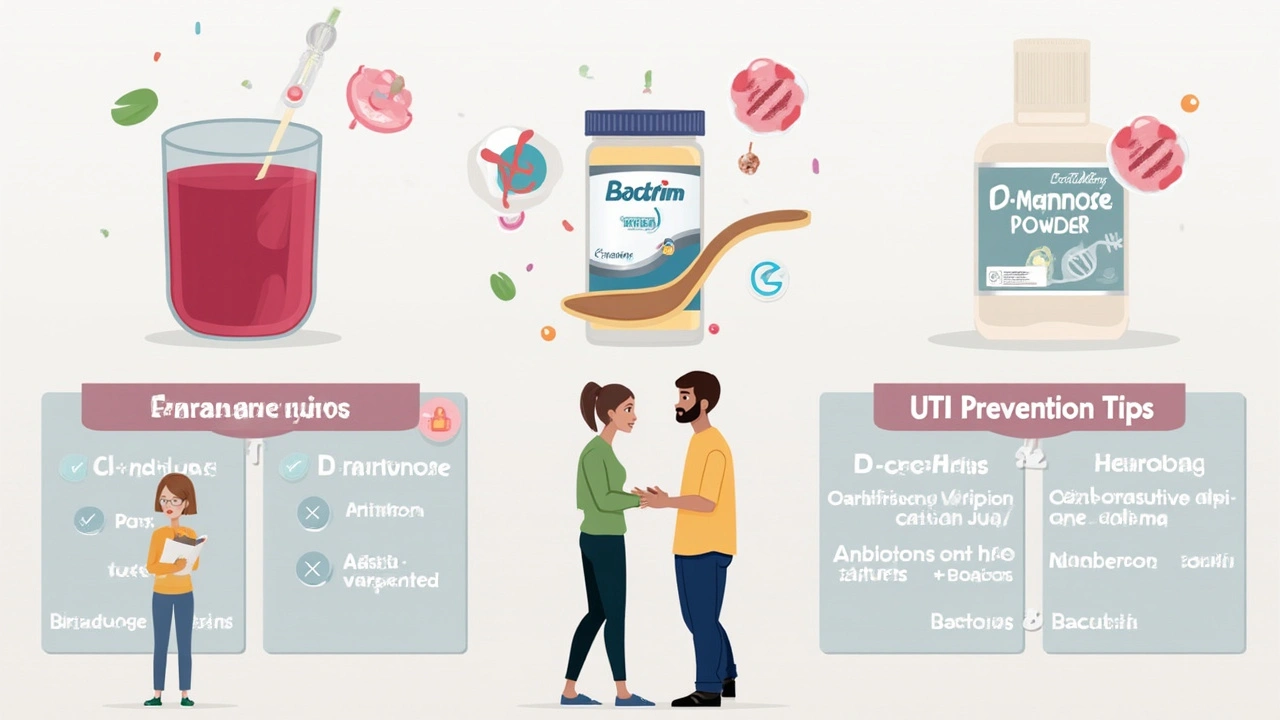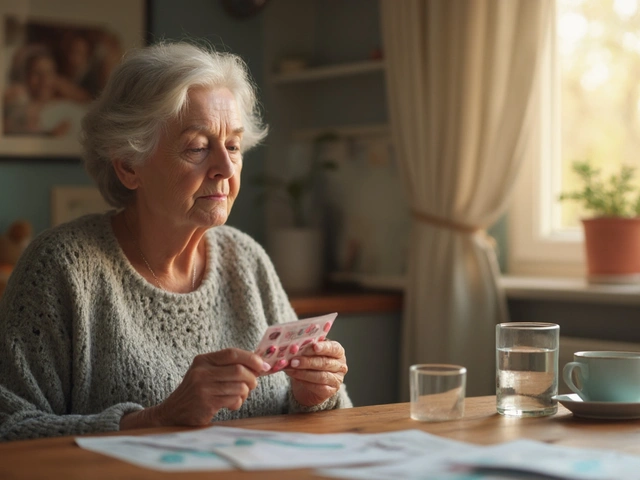Ever been told to drink cranberry juice for a UTI and laughed it off as folk medicine? It's not just old wives’ talk. As antibiotic resistance climbs and prescription drugs like Bactrim lose their punch, people are looking further than the drugstore for protection. But can nature’s sweet helpers like cranberry and D-mannose really do the job of a seasoned antibiotic? Or are we just desperate for a shortcut that sounds healthier?
Cranberry: Juicy Stories and Real Science
Cranberries have been riding a wild wave of health hype for decades. The idea is simple: something in cranberries keeps bacteria from sticking to your bladder wall, making it harder for an infection to start. But marketing isn’t science. So, is there actually proof this berry does anything useful?
Here’s what the data shows: Cranberry products don’t cure UTIs, but some clinical trials support the idea that they help prevent them, especially in women who keep getting infections. A meta-analysis out of Cochrane in 2023, reviewing over 50 studies, found that cranberry products cut UTI recurrence risk by about one-third in women prone to infections. Not bad for something you can grab at the grocery store. Another standout: the studies showing effect focused on pure cranberry extract or low-sugar juice, not “cranberry cocktail” loaded with extra sugar. That sticky sugar can feed bacteria, undoing any good the cranberries provide.
One trick: dosage really matters. Most studies use the equivalent of 36mg of proanthocyanidins (the active cranberry stuff) daily. Fewer milligrams, and you might as well skip it. Capsules and tablets are more reliable than juice, and they're less likely to wreck your teeth.
Is cranberry safe? Largely yes—unless you’re on blood thinners like warfarin, where it can mess with your medication. Also, those with kidney stones should talk to their doc before loading up. Side effects tend to be mild, mostly just GI upset if you overdo it.
Can you swap Bactrim for cranberry outright? If you already have a full-blown infection, forget it. Cranberry’s strength is prevention, not treatment. But if you’re one of those unlucky folks with four UTIs a year, daily cranberry could lower your risk of seeing another antibiotic prescription.
D-Mannose: Sweet Relief or Too Good to Be True?
If cranberry is the veteran, D-mannose is the hot rookie on the scene. D-mannose is a type of sugar, related to glucose, but your body doesn’t metabolize it the same way. Here’s the crazy part: most of it passes right through your system and ends up in your urine, where it meets up with E. coli—the villain behind 80%-85% of UTIs.
Why does that matter? E. coli bacteria have little arms that grab onto the bladder wall, but D-mannose binds to those same arms even better. So the bacteria latch onto the sugar and get flushed out the next time you pee. If that sounds simple, that’s because it is. It’s like a microscopic bait-and-switch.
A big study in 2014 compared women taking daily D-mannose powder to those on nitrofurantoin, a common antibiotic similar to Bactrim. The result? Roughly the same reduction in recurring UTIs. Even better, the D-mannose group had fewer side effects—mainly some mild bloating in a handful of cases. Another 2022 study found that, after six months, 57% of women using D-mannose for prevention stayed infection free, compared to 29% in the group doing nothing at all. Pretty decent odds, especially if you're wary of the gut-wrecking effects antibiotics can have.
Best part: D-mannose doesn’t seem to drive antibiotic resistance—because it’s not an antibiotic. That means you can use it without the guilt trip of helping build superbugs. Still, it’s not perfect. D-mannose is only proven to help prevent (or mildy treat) UTIs caused by E. coli. If you have a UTI caused by another bug, you’ll need something else.
Most folks can handle D-mannose just fine, but since it’s a sugar, diabetics should talk to a doctor first. There are rare cases of diarrhea or loose stools, especially if people go heavy-handed with the dose.

Bactrim: Still a Heavy Hitter, But Facing Tough Competition
Bactrim (a combo of sulfamethoxazole and trimethoprim) used to be the gold standard for knocking out UTIs. It works quickly, is easy to take, and is dirt cheap. But these days, it’s not the hero it once was.
The real problem? Resistance rates have shot up. In some areas of the US, up to 38% of E. coli causing community-acquired UTIs are now Bactrim-resistant, which means there's a real risk the drug won’t work even if prescribed correctly. Doctors now check local resistance data before recommending it. If resistance is over 20% in that region, guidelines urge you to look for something else.
Even if you dodge the resistance bullet, antibiotics like Bactrim can mess up your gut, kill off good bacteria, and trigger allergic reactions. There’s long-term risk too—every time you take an antibiotic, there’s a chance next time it won’t work as well. Plus, some folks just don’t like the idea of reaching for a prescription to solve every problem.
If you’re hoping to skip Bactrim but still need to prevent or treat UTIs, you’re not alone. You might want to scope out a non-antibiotic alternative to Bactrim—especially if you’re sick of fighting for a doctor’s appointment or your pharmacist’s concern about yet another round of pills.
Natural Adjuncts: When Do They Work, and Who Should Use Them?
So, you’re weighing cranberry and D-mannose, eyeing your last Bactrim refill and wondering—could natural stuff actually work for you? Here’s the straight talk: They work best in people who get frequent, uncomplicated UTIs, and especially in folks who are otherwise healthy and want to cut back on antibiotics. If you’re dealing with a raging infection (fever, chills, peeing razor blades), natural adjuncts are backup, not front-line defense.
Here are practical things to think about:
- Dosage discipline: For cranberry, standardized capsules with 36mg of proanthocyanidins daily is what most studies used. For D-mannose, typical regimens are 2 grams daily for prevention, or a bit more after intimacy or first UTI symptoms.
- Consistency rules: These aren’t miracle, one-off fixes. You get the most benefit when you take them regularly, just like a vitamin. Skipping days cuts down on the protection.
- Choose the right brand: Supplements aren’t all equal. Look for ones that state the amount of active ingredient per dose; avoid ones bloated with sugar, colors, or fillers.
- Pay attention to your meds: People on blood thinners, kidney meds, or with known allergies, need to run things by their doc first.
- Don’t self-treat persistent infections: If you have constant pain, blood in your urine, or symptoms hang on, that’s the alarm bell to talk to your doctor. Self-treatment is not smart in those cases.
Are they for everyone? Not quite. Pregnant people, those with complicated urinary tract anatomy, or anyone with a history of kidney disease should absolutely check in with their provider before going this route. If you do fit the right mold, though, adding a natural adjunct can seriously cut back on how often you deal with urinary drama.

Pitting Natural Adjuncts Against Bactrim: The Bottom Line
When you stack up cranberry and D-mannose prevention against Bactrim, here’s the real score: Antibiotics trump both for flattening a current, active infection, no contest. But if the name of the game is prevention and you want to sidestep antibiotic side effects, these natural options are miles ahead of doing nothing.
| Approach | Who Benefits Most? | Effectiveness (% Reduction in Recurrence) | Main Risks |
|---|---|---|---|
| Cranberry Supplement | Women with frequent UTIs, postmenopausal women | ~30%-35% | Mild GI upset, possible drug interaction with warfarin |
| D-Mannose | Anyone with E. coli-driven recurrent UTI | ~45%-55% | Rare GI upset, caution in diabetics |
| Bactrim (antibiotic) | Active infection, resistant cases | 70%-90% cure rate (if bacteria susceptible) | Resistance, allergic reaction, gut flora impact |
Here’s the toughest truth: UTI prevention needs a mix of habits, not just one magic supplement. Hydration, peeing after sex, not holding urine forever—those old tricks still matter. The natural route isn’t a free pass to ignore those basics.
Don’t forget: If you get a UTI that doesn’t clear up with prevention, don’t try to tough it out—left untreated, they can escalate fast, especially if you’re prone to kidney issues.
Bottom line: cranberry and D-mannose aren’t old wives’ tales—they’ve earned their spot at the table, but don’t expect miracles. Use them for steady prevention, pay attention to your body, and keep your provider in the loop if things get weird. Staying UTI-free is rarely about just one thing, but knowing your options is half the battle.




Louie Hadley
July 18, 2025 AT 04:51Really interesting post! I've heard a lot of buzz around cranberry and D-mannose for UTI prevention, but I always wondered how they stack up against prescription options like Bactrim. It's refreshing to see an analysis that digs into the science rather than just anecdotal evidence.
I've personally tried cranberry supplements before, and while they seemed to help reduce the frequency of infections, they weren't a total cure. I'm curious how the studies differentiate between prevention and treatment, especially considering how stubborn UTIs can be.
Also, are there any specific groups that benefit more? Like women prone to recurrent UTIs or people with compromised immune systems? It'd be great to hear about the safety aspects too because I’d hate for someone to switch to 'natural' without understanding risks.
Thanks for shedding light on this topic!
Max Rogers
July 20, 2025 AT 05:41Great read! To build on what you said, it's important to recognize that cranberry and D-mannose function quite differently from antibiotics like Bactrim. Cranberry works through proanthocyanidins which help prevent bacteria from adhering to the urinary tract lining, while D-mannose targets the specific bacteria (usually E. coli) that cause most UTIs.
However, one must be cautious, as neither are outright cures. They’re better considered as preventive supplements or adjuncts rather than replacements for antibiotics, especially when dealing with an active infection.
Also, I think the best advice from the article is the emphasis on consulting healthcare professionals before making any switches, since UTIs can sometimes lead to kidney infections if not treated properly.
Faye Bormann
July 22, 2025 AT 06:31Well, speaking from a somewhat skeptical standpoint, I find it amusing how everyone rushes to call cranberry juice and D-mannose 'miracle cures' for UTIs when the evidence is really quite mixed. Yes, the article mentions real-world studies, but often these studies have limitations—small sample sizes, short durations, or conflicts of interest.
Honestly, if natural remedies were that effective, doctors wouldn't be pushing antibiotics like Bactrim so hard. There’s a reason antibiotics remain the gold standard for treatment. Why put faith in these so-called adjuncts when you could develop resistance or, worse, delay proper treatment?
I'm not saying these supplements are useless, but the hype around them oversimplifies a complicated infection scenario that can easily spiral out of control. Personally, I prefer the tried and true, with some room for cautious supplementation at best.
Ginny Gladish
July 24, 2025 AT 07:21That’s fair enough, but it’s also important to acknowledge that overprescribing antibiotics leads to resistance, which is a huge global health issue. So looking for effective, non-antibiotic prevention methods, like cranberry and D-mannose, is not just trendy but necessary.
The article rightly points out statistical data backing some claims, and from what I’ve seen in the clinic, some patients do experience fewer infections with these supplements. The key is realistic expectations and combining them with good hydration and hygiene.
One note of caution though: not all cranberry products are created equal. The dosages and purity vary widely, which can skew results and patient experiences.
So yes, the science should be scrutinized, but let's not dismiss alternatives outright before more extensive research comes in.
Kathy Butterfield
July 26, 2025 AT 08:11Honestly, I just wanted to pop in and say thanks 🙌 I’ve suffered from recurrent UTIs for years and found Bactrim to be kind of a double-edged sword—effective but really rough on my stomach.
I started trying D-mannose a little over a year ago, and while it’s not a magic bullet, my flare-ups have definitely decreased. The article’s breakdown helped me understand why—it's all about the way D-mannose prevents bacteria from latching on.
Plus, cranberry juice holds a special place for me because it tastes good (as long as you don’t get the sugar-loaded stuff). At least it’s something I can remind myself to do daily without much struggle.
Anyone else out there had success combining these natural aids with doctor-prescribed treatment?
Really appreciate this post for bringing some clarity. 😊
Zane Nelson
July 28, 2025 AT 09:01While the anecdotal evidence is appealing, and I'm sure these supplements offer some degree of placebo or marginal benefit, the plain truth is that the pharmaceutical industry has invested heavily for a reason. Bactrim works, and its effectiveness is well-documented beyond the shadow of a doubt.
The 'natural' market thrives on the gullibility of people, and it's frankly irresponsible to promote cranberry or D-mannose as equivalent without considering economic and clinical realities.
I'd suggest readers retain discernment and not get swept up in the allure of 'natural' just because it's trendy or sounds healthier. At best, consider these adjuncts with professional guidance, not as substitutes.
Sahithi Bhasyam
July 30, 2025 AT 09:51Wow this is sooo informative! :D I always thought cranberry juice was kinda overrated, but this post breaks down exactly why it might help — especially the part about bacteria sticking to urinary tract lining, which I never knew about.
But also, totally agree that it’s not a magic cure. Like, it’s super important to keep the antibiotics in the mix when necessary. I know some friends who tried only natural stuff and ended up with worse infections, ugh.
Anyone else here use a combo of diets, hydration, and these natural supplements? Would love to know the best way to do this safely :)
Anyway thanks for the legit deets! <3
mike putty
August 1, 2025 AT 10:41This post really resonates with me. I’ve dealt with UTIs on and off for years and was always wary of long-term antibiotic use. Seeing real evidence pointing to preventive measures that are less invasive is encouraging.
I do find that hydration and cranberry supplements provide some relief, but I always keep an open dialogue with my doctor to ensure I’m not neglecting anything serious.
It’s worth mentioning that every body is different, so what works for one person may not for another. Articles like this help foster informed, personalized care decisions.
Thanks for bringing this important info into the discussion!
Kayla Reeves
August 3, 2025 AT 11:31I honestly don’t see the fascination with cranberry or D-mannose unless you’re in denial about needing actual medicine. UTIs are painful and can be dangerous if not properly treated. People should stop fetishizing these so-called natural cures and seek appropriate medical help instead.
This post is thorough, sure, but leaning too hard into natural prevention without highlighting how quickly UTIs can worsen seems irresponsible. Bactrim and similar antibiotics have saved countless people from severe infections. Don’t forget that.
So please, don’t glamorize supplements when the stakes are this high.
Abhinanda Mallick
August 5, 2025 AT 12:21In my view, the focus on these natural remedies sometimes distracts from proper healthcare access and education, especially in regions where antibiotics are not always readily available.
Studies mentioned should be interpreted with caution; they often arise from Western-centric medical models which may not align universally. I’m not disputing the science but stressing cultural context matters.
At the end of the day, whether one chooses Bactrim, cranberry, or D-mannose, the priority must be effective treatment without overuse or misuse of antibiotics. Balance is key.
Richard Wieland
August 7, 2025 AT 13:11Very well-written post and some thoughtful comments here. It’s clear that understanding UTI prevention requires a nuanced approach. Antibiotics like Bactrim will remain essential for acute infections, but exploring non-antibiotic options for prevention is wise, especially amid rising antibiotic resistance.
Scientific evidence supports the mechanistic roles of cranberry and D-mannose, though not as standalone cures. They offer complementary protection, particularly for individuals with recurrent UTIs.
As always, consult your healthcare provider to tailor strategies, considering individual health background and infection history.
Faye Bormann
August 9, 2025 AT 14:01@560 I appreciate your experience and perspective! It’s crucial to highlight that natural supplements can sometimes reduce reliance on antibiotics, which is definitely a plus. But do you think there’s enough guidance out there on proper usage? I worry some folks just consume random doses without real knowledge.
Also, do you find any particular cranberry products work better than others? I’ve seen mixed reviews and wonder if it’s due to formulation differences.